Sitting alone in her quiet gardens, reciting verses of poetry and waiting for the end to come. This is how Princess Zeb-un-Nisa spent the final years of her life. Zeb-un-Nisa means “jewel among women,” and she truly deserved that title. Zeb-un-Nisa was a gem in the Mughal harem, she was an extremely intelligent and bright child, who grew up to be an administrator and scholar. Unfortunately, her life would be filled with its fair share of misfortunes, specifically when she was imprisoned for encouraging her brother to revolt against their father. She was a brilliant poet, scholar, and an icon of womanhood, but her end was something that no one could have expected.
Early life of Zeb-un-Nisa
On February 15th 1639, Princess Zeb-un-Nisa was born. She was the eldest daughter of Prince Muhi al-Din Muhammad (the future Emperor Aurangzeb) and his first wife and chief consort, Dilras Banu Begum. Her birth was a happy event for both parents, and Shah Jahan also celebrated the birth of the young princess. From the beginning, life for Zeb-un-Nisa seemed filled with promise and happiness.
Being born in a Muslim household meant that children would start learning to recite the Quran from an early age. To her father’s delight, in 1646 Zeb-un-Nisa became a Hafiza (someone who memorized the Quran) at the young age of seven. Overjoyed by his daughter’s achievement, Prince Aurangzeb celebrated his daughter’s achievement by hosting a grand feast, donating 30,000 mohurs to the poor and enacting a two-day holiday in her honor.
Impressed by his granddaughter’s achievements, Emperor Shah Jahan betrothed Zeb-un-Nisa to Suliman Shikoh, the son of Dara Shikoh. Unfortunately, the happy days came to an end when in 1657, Shah Jahan fell ill.
From 1657-1659, Zeb-un-Nisa was witness to the war of succession. At the age of 20, she would become estranged from her grandfather and aunt, Jahanara, while her uncles and their sons would be put to death. Due to missing sources, we do not know what sort of reaction Zeb-un-Nisa might have had at the time.
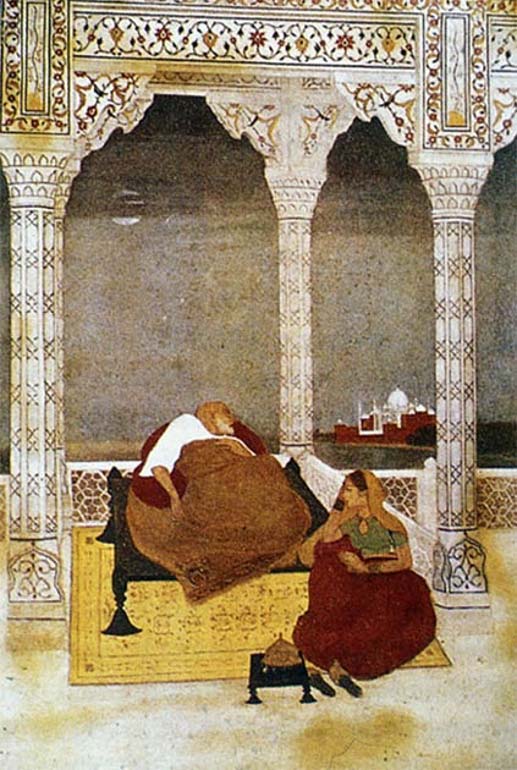
Zeb-un-Nisa had strong female role models in the form of Jahanara and Empress Nur Jahan, both women who had excelled in a male-dominated society. Here Jahanara can be seen at the side of Shah Jahan. ( Public domain )
Education and Literary Work in the Harem
Within Mughal royalty, Emperor Akbar, who had very little formal education, made proper arrangements for imparting education to the ladies of the imperial harem . Aurangzeb had been deeply impressed by the intelligence of his daughter and wanted to nurture her scholarly spirit; he hired the best tutors from various fields.
Zeb-un-Nisa had an excellent role model in Jahanara and Empress Nur Jahan , women who had established themselves in a male-dominated society. She excelled in her studies – memorizing the Quran at such a young age showed a high natural ability. Her studies consisted of astronomy, mathematics, history, philosophy, and literature; and the young princess excelled in languages like Persian, Arabic and Urdu.
In 1653, the 14-year-old Zeb-un-Nisa started to narrate Persian poetry and her tutor, Ustad Bayaz encouraged her to further pursue poetry. Zeb-un-Nisa used to secretly participate in hidden literary and poetry parties, where great poets like Ghani Kashmiri, Nai’matullah Khan, among others participated.
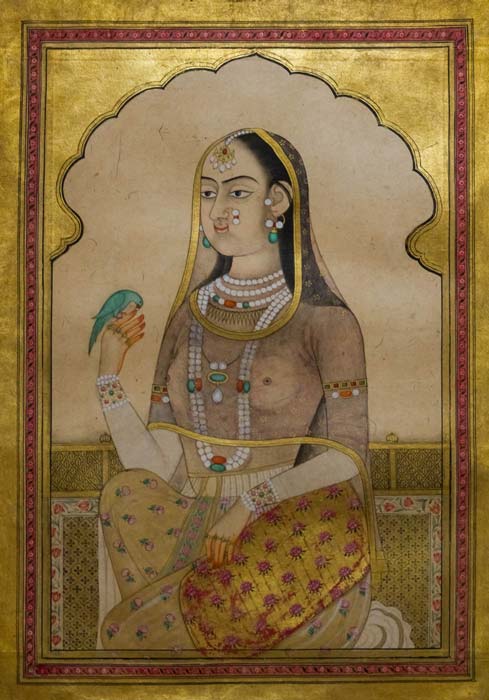
The Mughal princess Zeb-un-Nisa baffled her opponents in poetic battles, despite opposition from her father. ( Public domain )
Poetic Battles and Astounding Verse: Zeb-un-Nisa the Poet
Zeb-un-Nisa participated in poetic battles and she would baffle her opponents with her innovative disposition and cheerful imagination. Her passion for poetry can be seen by the fact that she would spend her nights in a poetic fancy and her mornings in composing verses. One day Aurangzeb happened to pass by his daughter. Upon seeing him Zeb-un-Nisa composed the following verse:
“O ignorant nightingale! Hold tight your breath in your throat
The delicate disposition of kings cannot bear poetic composition.”
As the years passed Zeb-un-Nisa began to write under the pen name of Makhfi meaning “the hidden one.” Her collection of poems called Diwan-i-Makhfi, contained approximately 5,000 verses. She is also accredited with writing other books as well, like Monis-ul-Roh, Zeb-ul Monsha’at (a collection of letters) and Zeb-ul-Tafasir. Her writings have been preserved for the enjoyment of future generations; they are a window into the mind of the poetess.
Zeb-un-Nisa inherited the love of Sufism from her aunt Jahanara and Uncle Dara Shikoh, we do not know the extent of the impact they had upon the young princess. However, her poetry shows a love for Sufism. Aurangzeb, on the other hand, did not sympathize with the Sufi faith, therefore, we can understand that Zeb-un-Nisa’s family did have an impact on her beliefs and thinking. That would all come to an end in 1659, when she would witness the deaths and imprisonment of several family members.
Despite all the education and knowledge that she was able to accumulate through the years, it doesn’t change the fact that Zeb-un-Nisa was confined to life in the harem. She became a patron for the arts and literature. Donating money to enable budding scholars, poets, and artists to purse their work with ease, by doing so she was also promoting education and rewarding it. Zeb-un-Nisa would provide grants to scholars that would produce numerous copies of known writers. Even creating an entire department of writers and calligraphers, who would work on numerous translations and create original work.
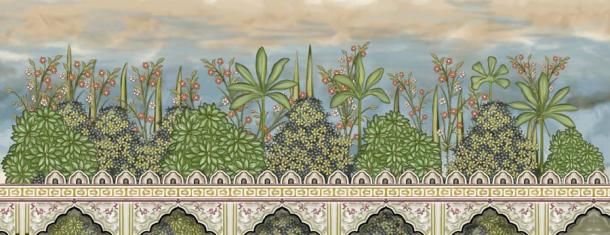
The life of Neb-un-Nisa was that of a princess in a gilded cage, or garden in her case. From life in a harem to her later imprisonment, she remained locked away. ( noor / Adobe Stock)
Zeb-un-Nisa Inside the Harem
Zeb-un-Nisa was the favorite child of her father, but she still had to obey the rules of the Harem; like observing the tradition of Purdah and staying within the walls of the Zanana (Harem). The Zanana was a “gilded cage” for the royal women. However, there are examples of women who were able to excel in many fields despite all the restrictions placed upon them. Nur Jahan and Jahanara paved the way for Zeb-un-Nisa, they showed how women could take part in the running of the administration, or even take part in hunting trips and wars.
Upon Aurangzeb’s ascension to the Mughal throne, he would often consult Zeb-un-Nisa in affairs of the court, being proclaimed the Emperor’s advisor at the age of 21. The responsibility certainly raised her status, but she always had to remain veiled when she was outside the women quarters. However, life in the Zanana did come with its advantages as well, the women could own land, conduct trade, and were even entitled to an allowance on top of their own earnings.
Women were provided with food and other necessities of life, and they even possessed vast quantities of jewelry. These riches ensured that they could live a lavish and luxurious life, however, women like Jahanara and Zeb-un-Nis used their wealth to become patrons for scholars and poets. Zeb-un-Nisa even conducted many building projects but unfortunately hardly any of these buildings or gardens remain.
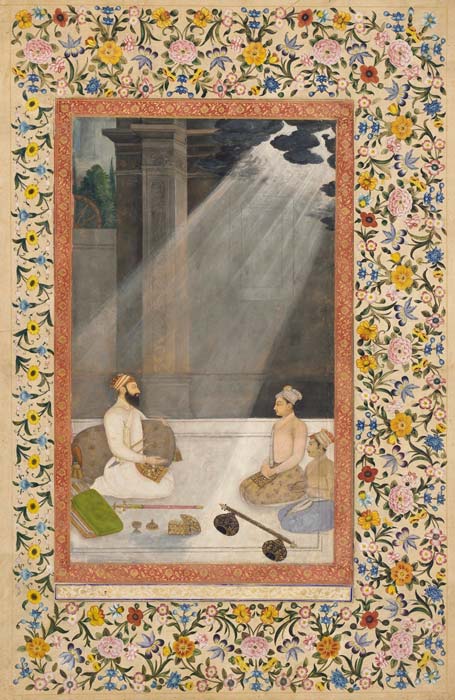
Emperor Aurangzeb had a close relationship with his daughter Zeb-un-Nisa, until cracks began to form. She was ultimately imprisoned for her remaining days. ( Public domain )
Daughter vs Father: The Estrangement of Zeb-un-Nisa and Aurangzeb
The relationship between Zeb-un-Nisa and her father, Aurangzeb had been good. However, their relationships dynamic began to change after Aurangzeb became emperor. There is no denying that her father appreciated and recognized her administrative capabilities, which is proven when Zeb-un-Nisa was declared his advisor.
Aurangzeb was a puritan Muslim, while Zeb-un-Nisa had leanings towards the Sufi faith . Ideological issues existed between the two, but it did not seem to affect their partnership in trying to lead the government. Unfortunately, as time passed events unfolded that would drive a knife between the father and daughter.
Being a puritan, Aurangzeb banned music, dancing, drinking, singing and poetry. His dislike for poetry was well-known by his courtiers, therefore he was very ruthless towards poets. Hidden from her father, Zeb-un-Nisa would not only write poetry but also take part in secret underground poetry competitions. Her poetry was a way for her to reflect her beliefs, many of her poems praised Sufism.
Historians, believe that one of her poetic influences was the crown prince and her uncle, Dara Shikoh. He, himself had been a poet with strong Sufi leanings. Zeb-un-Nisa identified more with her uncle and grew spiritually closer to Sufism. Being betrothed to her uncle’s son, Sulieman Shikoh, made a stronger bond between uncle and niece. Even her aunt, Jahanara, had been a big influence upon her niece; she wrote books of Sufi saints and was like a role model for Zeb-un-Nisa.
Upon Dara’s defeat at the hands of his brother, Zeb-un-Nisa witnessed the death of not just her fiancé but her beloved uncle as well. Cracks had begun to form in her relationship with her father, causing her to question the way he ruled in the future. Another blow to Aurangzeb came in 1666, when he had arrested Shivaji; an adversary who had been causing problems for the emperor. Shivaji was placed under house arrest, despite all the security he and his son were able to escape. When the escape was investigated, to Aurangzeb’s shock, Zeb-un-Nisa had orchestrated the escape. Betrayed, Aurangzeb’s relationship with his daughter became strained.
The final blow came in 1681, when Aurangzeb’s son, Muhammad Akbar revolted against his father. The young prince had been instructed to persuade the Rajput’s to join with the Mughals, instead it was Akbar who had been convinced by the Rajput’s to revolt against his father’s tyrannical rule. Akbar lacked the military skills of his father, so he was defeated and driven out of India. Aurangzeb soon came to realize that Akbar was not alone in the revolt. Zeb-un-Nisa had been exchanging secret correspondences with her brother, helping him plan the rebellion against their father.
History seems to be repeating itself in the Mughal empire , where sons turn against their fathers. Aurangzeb, like Shah Jahan had tried to prevent this, but it seems even he could not stop such events from unravelling. Zeb-un-Nisa could not escape punishment this time, she was imprisoned at the Salimgarh Fort. This fort had become famous for having housed the emperor’s brothers; the imprisoned Murad Baksh and Dara Shikoh.
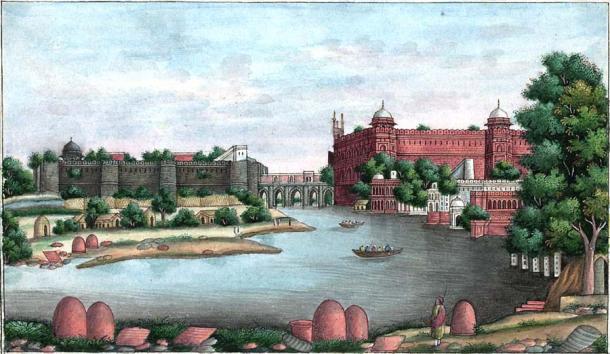
Zeb-un-Nisa was imprisoned at Salimgarh Fort, seen here on the left, in Delhi. ( Public domain )
Zeb-un-Nisa and Akil Khan: Tragic Love Within a Garden Prison
It is hard to imagine the feelings that would have gone through Zeb-un-Nisa’s mind, as she would have seen others achieve a milestone she could not, namely marriage. Events such as the henna night before marriage, which was a highly enjoyable event during which the bride’s hand and feet would be painted with delicate patterns, would have been torture. Zeb-un-Nisa would have taken part in such events but would never have been the center of attention herself.
At a young age, her grandfather, Emperor Shah Jahan betrothed Zeb-un-Nisa to Suliman Shikoh, son of Dara Shikoh. Unfortunately, when Aurangzeb ascended the throne, he was determined to extinguish all the threats to his reign, which meant that Dara and his son Suleiman would also have to die. So Zeb-un-Nisa lost her betrothed at a very young age.
Finding another match would become very difficult although another proposal came in the form of Mirza Farrukh. However, this proposal also ended in bitterness because Zeb-un-Nisa found Mirza to be discourteous. Another problem for Zeb-un-Nisa as narrated by Soma Mukherjee, that Aurangzeb kept a watchful eye on his daughter. The author believes that he had been trying to catch her in the act.
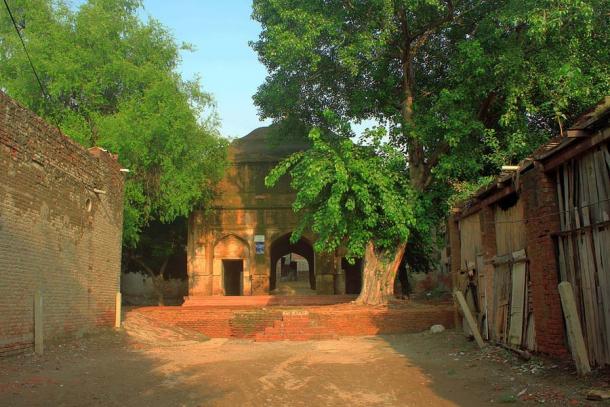
The forlorn tomb of Zeb-un-Nisa along a main road in Lahore is said to be her final resting place, although some claim her tomb was located in Delhi. (Meemjee / CC BY-SA 3.0 )
Fortunately for Zeb-un-Nisa, she met the love of her life through poetry. Akil Khan, the governor of Lahore, had been riding around the walls of the palace when he caught a glimpse of princess Zeb-un-Nisa on the roof. It was then that he declared that “a vision in red appears on the roof of the palace.” These words soon reached the ears of the princess and she responded, “Supplications nor force nor gold can win her.” This poetic exchange began their love story . There are two fields of thought, one being that Aurangzeb declined Akil Khan’s proposal. On the other hand, it is said that Akil declined to travel to the palace to meet Aurangzeb to talk about the proposal because he feared being put to death.
Being unable to marry the princess, Akil Khan, consumed by love, abandoned his position, wealth, and property, thus, starting to live as a mendicant. During Zeb-un-Nisa’s imprisonment in her own built garden, she and Akil Khan are reunited. Safe from her father, she was able to pursue a relationship with her love. This lasted for years until their relationship was discovered, and her lover was executed in front of her eyes. Her remaining years were spent in solitude focusing upon her religious devotion, until her death in 1702.
Zeb-un-Nisa had a love of learning which only deepened as time passed, her library was very impressive. Her poetry was soothing a complete contrast to her distressing life. She had been blessed with everything, but upon her imprisonment she was deprived of all that made her life bearable. She had loved and lost, watching those she loved killed before her eyes. Even though her architectural monuments have not survived the test of time, her poetic and scholarly contributions have been preserved and therefore continue to keep her name alive as one of the great Mughal women from history.
Top image: Zeb-un-Nisa was a Mughal Princess and rebel poetess who ended her days in a gilded garden prison. Source: Abanindranath Tagore / CC BY-SA 3.0
By Khadija Tauseef
Related posts:
Views: 0
 RSS Feed
RSS Feed
















 March 4th, 2021
March 4th, 2021  Awake Goy
Awake Goy  Posted in
Posted in  Tags:
Tags: 
















